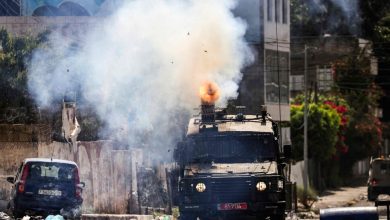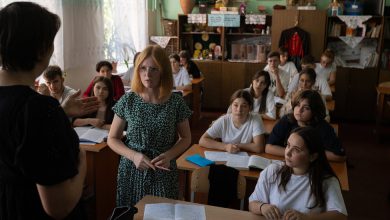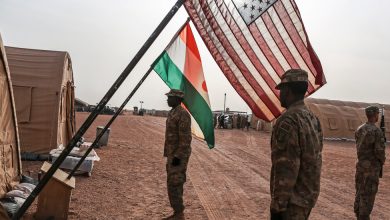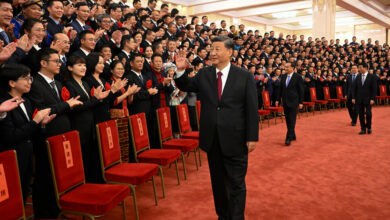Tyre Nichols Cried in Anguish. Memphis Officers Kept Hitting.
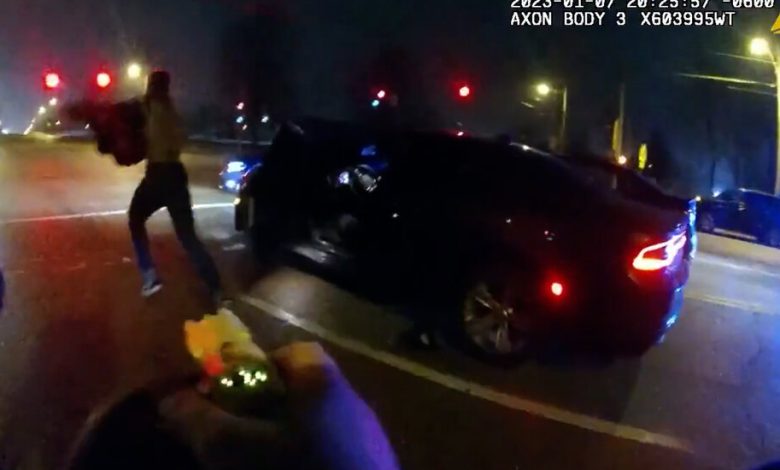
MEMPHIS — The police officers kicked Tyre Nichols in the head, pepper-sprayed him and hit him repeatedly with a baton, even as he showed no signs of fighting back. At one point, after Mr. Nichols stood up, one officer struck him with at least five forceful blows while another held Mr. Nichols’s hands behind his back.
Soon, Mr. Nichols, 29, was on the ground — not far from the home he shared with his mother and stepfather — crying out in anguish: “Mom, Mom, Mom.”
Officials in Memphis released roughly an hour of video on Friday that captured how a traffic stop involving Mr. Nichols on Jan. 7 turned deadly during a second encounter after he fled on foot. The video, which was posted online in four segments just before 6 p.m., provided a degree of long-awaited clarity for the many people in Memphis and around the country who have demanded to know what happened. Yet it also failed to answer essential questions, including why the police pulled over Mr. Nichols, who was Black, to begin with.
The video was shared a day after five officers, all of them also Black, were charged with second-degree murder in connection with Mr. Nichols’s death. Soon after he died in a hospital three days after the beating, city officials promised to share the footage with the public as a measure of transparency in a case that has unsettled and angered much of the community and the nation.
In a clear signal of trepidation over how the city would react, the video’s release was preceded by pleas from elected officials, civic leaders and Mr. Nichols’s family to not let outrage grow into destructive unrest. Protesters gathered in Memphis on Friday night, spilling onto a main interstate highway and blocking a bridge, but the concerns about violent confrontations were not yet realized.
Memphis had been bracing. Law enforcement officers from across Tennessee were standing by, the city’s public schools canceled after-school activities on Friday, and some businesses boarded up windows and cautioned their employees about potential disruptions downtown. Many in the city had also been girding themselves for viewing scenes they knew would be upsetting.
“Tonight will be one of the toughest nights that we will ever experience in the city,” Van Turner Jr., the president of the Memphis branch of the N.A.A.C.P., said in a news conference on Friday morning, noting the sorrow that had already been coursing through Memphis in recent days.

Protesters in Memphis blocked traffic on a bridge on Friday.Credit…Brad J. Vest for The New York Times
The video reverberated beyond the city, as the case has tapped into an enduring frustration over Black men having fatal encounters with police officers. There were small protests in Washington, D.C., New York City and Sacramento, where Mr. Nichols had lived before Memphis. President Biden said in a statement that the video had left him “outraged and deeply pained.”
It is another reminder, he said, “of the profound fear and trauma, the pain, and the exhaustion that Black and Brown Americans experience every single day.”
DeVante Hill, an activist who was planning to hold a rally in Memphis on Saturday, expressed a level of exasperation. “I wish I could say I’m sick and caught off guard, but I’m not,” he said, describing complaints against the Memphis Police Department stretching over generations. “I am not shocked as much as I am disgusted.”
Still, he acknowledged the gravity of the case. “This is a defining moment,” Mr. Hill said, “not just for Memphis, but for the entire country in how we handle police brutality.”
It was a sentiment echoed by Mr. Nichols’s family on Friday as they pushed for his death to become an impetus for changes in the Memphis Police Department and in law enforcement more broadly.
They cast police culture as just as much of a culprit in his death as the officers who pummeled him.
“To the five police officers that murdered my son, you also disgraced your own families when you did this,” RowVaughn Wells, Mr. Nichols’s mother, said in the news conference. “I’m going to pray for you and your families, because at the end of the day, this shouldn’t have happened. This just shouldn’t have happened. We want justice for my son.”
The family’s lawyers demanded that the Police Department disband specialized groups like the Scorpion unit, which the officers who pulled Mr. Nichols over were part of; the unit had been designed to patrol areas of the city struggling with persistent crime and violence. One of the lawyers, Antonio Romanucci, said units that saturate neighborhoods under the guise of crime-fighting end up oppressing young people and people of color, often operating with aggression and impunity.
Such behavior was reflected in the video, they said — in the way the officers swarmed Mr. Nichols and pursued him over a stop that was apparently for a minor traffic violation.
“It’s a traffic stop, for God’s sake,” Ben Crump, a prominent civil rights lawyer who is also representing the family, said on Friday.
Cerelyn Davis, the Memphis police chief, has ordered a review of specialized groups like the Scorpion unit, which she had launched soon after she took over the department in 2021. The city’s mayor, Jim Strickland, said in an appearance on Friday on a podcast produced by The Daily Memphian that the unit was now inactive.
But Mr. Strickland added that he was also focused on a more substantial examination of the culture within the Police Department, and how officers interact with the community. “We still need to examine if there’s anything that we could do to prevent this from happening again,” Mr. Strickland said on the podcast.
Mr. Nichols was stopped on the evening of Jan. 7 in the southeastern corner of the city. Officers forced him out of his car and wrestled him to the ground, according to the videos. He dropped to the ground and laid on his side, imploring the officers to stop and saying, “I’m just trying to get home,” as they held down different parts of his body.
Though he appeared to show no resistance, the police threatened to hurt him further and continued to order him to get on the ground, apparently wanting him to roll onto his stomach. About two minutes into the encounter, an officer directed pepper spray at his face. At that point, Mr. Nichols got up from the ground and ran from the officers, one of whom fired a stun gun at him.
About eight minutes later, officers caught up with him again in a residential area near his family’s home. After tackling him, they beat him severely, as Mr. Nichols screamed in agony.
A body-worn camera and a surveillance camera captured police officers continuing their assault on Mr. Nichols, with one kicking him so hard in the face that the officer nearly fell down. Throughout the beating, which lasted about three minutes, Mr. Nichols did not appear to ever strike back. Several times, he moved his hands to cover his face, seeming to cower from the officers’ blows.
An independent autopsy commissioned by his family found that Mr. Nichols “suffered extensive bleeding caused by a severe beating,” according to preliminary findings released this week.
On Friday, Chief Davis said the Police Department’s internal inquiry had not yet found any evidence substantiating the claim that Mr. Nichols had been driving recklessly. After her staff pulled all possible video from the surrounding area, including from roadways and officers’ body cameras, “the only thing that we have right now,” she said, “is the officer saying that Mr. Nichols was driving recklessly, initially on the wrong side of the road.”
Prosecutors announced on Thursday that a grand jury returned indictments against the five officers — Tadarrius Bean, Demetrius Haley, Emmitt Martin III, Desmond Mills Jr. and Justin Smith — with charges that include kidnapping, official misconduct and official oppression, in addition to second-degree murder.
The officers, who were also arrested and booked at the Shelby County jail on Thursday, have all been released after posting bail. Lawyers for the officers said that they had not been able to see the video in advance. But they urged the community to avoid rushing to judgment. Blake Ballin, who represents Mr. Mills, acknowledged the content of the video was likely painful for the community to see, but that video would necessarily give a comprehensive account of what happened. “I don’t know how many angles, I don’t know the perspective,” he said. “There’s always more to the story.”
City officials decided to wait until 6 p.m. to release the video because that was when schools and most of the businesses downtown would be closed.
“Very, very few people will be at work,” said Frank Colvett Jr., a councilman from the city’s east side, who was not involved in that planning. “Everyone will have had plenty of time to get home from school, from their jobs, and just stay home.”
Michalyn Easter-Thomas, a Memphis city councilwoman, said all City Council members had an opportunity to see the video before the release. But she was among those who decided against watching it. Activists with Black Lives Matter of Memphis said they were going to avoid doing so.
Ms. Wells, Mr. Nichols’s mother, said she could not finish it. “I’ve heard it is very horrific, very horrific,” she said. “And any of you who have children, please don’t let them see it.”
Ms. Easter-Thomas felt like she didn’t need to “see it in order to know what was done,” she said. But she did not discourage others. “For some,” she said, “it will help them see the truth.”
Mr. Colvett said one of his primary conclusions after seeing a portion of the video was about the character of the officers: “I no longer consider them Memphians.”
Jessica Jaglois, Jesus Jiménez, Nicholas Bogel-Burroughs and Mark Walker contributed reporting from Memphis. Reporting was also contributed by Richard Fausset,Eliza Fawcett, Jacey Fortin, Mitch Smith and Remy Tumin.


